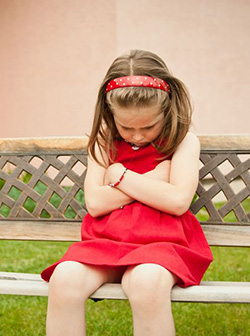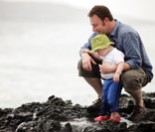My eight year old daughter has been having a really tough time handling her emotions lately, particularly anger. She has always been a sensitive girl and somewhat reactive but she seems to be finding it harder and harder to manage her temper. We have investigated specific causes for her anger and nothing has turned up. Do you have any tips for helping her manage her anger?
Any suggestions would be appreciated,
Treena (Mum of three – 4, 8 & 11)
Great question Treena,
Learning to interpret and handle our emotions, particularly intense and uncomfortable emotions like anger, is one of the most challenging and valuable skills we can learn … and teach our children.
Anger often gets a bad rap because it is unpleasant to experience and is often expressed in inappropriate and destructive ways. It is important to remember though that all of our emotions serve an important purpose – to keep us safe and enhance our health, wellbeing and ultimately our survival. Emotions are our body’s way of getting our attention and communicating important information with us. And it is our job to interpret and respond to those messages in some way.
Of course that can be difficult to do when we are in the throws of an intense physiological response.
In my coaching practice, I often teach children to follow a three-step process to manage strong emotions.
1. Name It
What is this feeling?
How strong is it? Give it a number from 1-10
2. Tame It
Use calming strategies, such as slow belly breathing, to bring down the emotional intensity. It is very difficult to think logically and respond in an appropriate and useful way when everything inside us is screaming at us to either fight or flee. Only proceed to the next step when you have successfully lowered the strength of your emotions to a manageable level – about a three.
3. Reframe It
This is where we interpret the emotional message, have a bit of a rethink and refocus our mind on solving our problem in a more constructive, proactive and helpful way. Instead of zeroing in on the problem and aspect outside of our control, we actively look at what we can control and search for aspects of the situation we can change.
For this tool to be most useful, I would suggest
- Introducing the process to your daughter when she is calm
- Establishing yourself as an ally who is here to help your daughter learn to manage intense feelings in a more positive way
- Set some clear guidelines and expectations for the appropriate expression of anger
- Have her pick a specific place and strategy she can use to cool down
- Print out the process and keep it in that place to use as a guide
- Be available to guide and support her through the 3-step process while she is getting the hang of it. It will take time to master and become second nature but with time and reinforcement it will become automatic.
- Praise her effort and attempts to manage her emotions positively and use mistakes as opportunities for learning and improvement.
When we learn to interpret the emotional messages that are being communicated, manage the intensity of our physical response, and proactively respond in helpful and positive ways, our emotions, even the unpleasant ones, can become really powerful tools that we can use to guide us throughout our lives.
I hope you find this strategy helpful and would love to hear how you all get on!
;0) Jen
The Kids Coach
If you have a question about an aspect of your child’s social or emotional wellbeing that you would like answered simply email jen@thekidscoach with the subject line ‘Ask The Kids Coach’.








Very useful tips. And I’d like to add that being friends wiht kids and communicating all the time will aso help to avoid kid’s aggression. For mostly kids are agressive when parents don’t and don’t want to understand them. Thanks for sharing! 🙂
Good points. (of course sometimes we actually don’t understand them) but communication is so crucial to really understanding what both yours, and your child’s needs are. — Jarrod